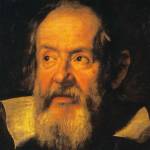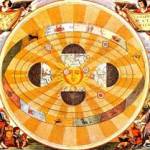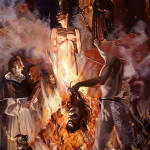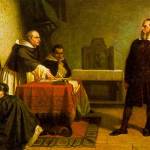
A re-post of my Galileo and the Modern Compromise:
IN HIS OPEN LETTER to the Grand Duchess Christina (1615), Galileo offered a defense of science against the prevailing heavy hand of religious orthodoxy:
“But I do not feel obliged to believe that that same God who has endowed us with senses, reason, and intellect has intended to forgo their use and by some other means to give us knowledge which we can attain by them. He would not require us to deny sense and reason in physical matters which are set before our eyes and minds by direct experience or necessary demonstrations.”

The immediate context was the great debate over the geocentric and heliocentric models. The larger context was the tension between religious philosophy, which stressed faith in revelation and tradition, and Renaissance philosophy, which stressed observation and reason. How, for example, should we decide whether the earth or the sun is at the center of our cosmos? Should we trust the views handed down to us by the best theologians of the centuries, those views derived primarily from Scripture? Or should we trust the views presented to us by scientists, their theories based on observational data from telescopes and other instruments and mathematical calculations of that data?
The traditionalist position was that reliance on observation and reason — when that conflicts with Scripture and tradition — is heresy. Giordano Bruno was convicted and executed, in part, for such heresy. When reason conflicts with faith, reason must give way. Or else.
Galileo’s solution is to argue that God wrote Scripture, of course, so Scripture contains the truth — and that God also created nature, and so nature also contains truth. God also created us humans, giving us sense organs and intelligence. So we can study Scripture rationally and learn important truths, as theologians do. But we can and should study nature rationally and learn important truths, as scientists do. And since both Scripture and nature come from the same author — God wrote two books, so to speak — the best theology and the best science should be compatible.

Consequently, the real heretics are those who place faith over reason and who use apparent theoretical conflicts as a pretext for persecuting or killing their intellectual opponents. The truly devout, by direct contrast, are those who use their best intelligence, as God intended when He gave it to us, to try to understand the universe and who, when intellectual conflicts arise along the way, use reasonable methods — discussion, debate, and further investigation — to resolve them.
I call this “the modern compromise” because versions of it are also found in Francis Bacon, René Descartes, and John Locke. In Galileo’s version, the intellectual turf is divided into two realms — the natural and the supernatural — and as long as scientists and theologians stick to their own turf, there should be no problems.
Locke uses the same dualist point is used to argue for the separation of church and state: “The boundaries on both sides are fixed and immovable. He jumbles heaven and earth together, the things most remote and opposite, who mixes these two societies, which are in their original, end, business, and in everything perfectly distinct and infinitely different from each other” (A Letter concerning Toleration [1689]).
So the early modern compromise is to use a strong metaphysical dualism to separate the natural and the supernatural, the realm of science and the realm of religion, the scope of the state’s power and the scope of the church’s, the physical and the spiritual, the factual and the moral. As long as everyone stays on their side of the line, we can avoid conflict.

I sometimes wonder to what extent the dualism was a genuine metaphysical claim by these founding modern thinkers — and to what extent it was a tactical claim to create a safety zone for naturalistic life and inquiry, given the often-dangerous religious orthodoxies of the time.
Despite having lost much of Europe to the Protestants over the preceding century, the Catholic Church was far from toothless, especially in southern Europe, and in 1616 it issued a Codex with a formal response to Galileo’s argument and the threat of heliocentrism:
“Propositions to be forbidden: That the sun is immovable at the center of the heaven; that the earth is not at the center of the heaven, and is not immovable; but moves by a double motion.”
Thus the stage was set for continued tension on both sides and Galileo’s trial for heresy in the 1633.
Related: Galileo on the proper relationship between science and religion, in the Philosophers, Explained series:
Once more, faith opposes reason in what is usually a struggle of misunderstanding. Blind faith, or blind reason (having incorrect premises) is not conveyed by the Bible in particular. The Roman Catholic church had kept the Bible from its parishioners for centuries. The Waldensees, for example, were burnt at the stake for reading it in public to interested parties. So the clergy’s stranglehold on “truth” depended on the “laity” not reading the Bible directly. But Galileo had a better informed view.
The Bible is not a scientific book, yet it describes (Job) the earth as “a round circle hanging on nothing” ; Moses picks out the first eleven steps of Creation on his first try, that is, one out of 1,100,000 chances, and Science later discovers them ; the cycle of rain-to-ocean-to-cloud is correctly described ; David writes “you wrote the parts of me down in a book,” and now we tout DNA as an encyclopedia of codes which produce a man, or worm, or goat. Indeed, the worm has more genes than do we.
Galileo believed in a Creator, as did Newton. To be scientific in no way precludes believing in an aspect of reality which is “spiritual” (supernatural is a bad term, suggestive of ghosts and what-not). Indeed, there seems to be a Higgs boson, that is the main ingredient of reality (excluding life, consciousness, reason, &c). That very substance includes, we presume, space and time. On this forum we are directed by the Hicks Boson, which rare particles preclude contradictions and, when the Master thinks, the whole universe may change. It is something like Aristotle’s view that God has only to think, something as in Scripture, “His word never goes out without being fulfilled.”
Alas! On this rare phenomenon others must continue to dwell and to speculate. That solar wind fills our sails, and propels us into the future! Hopefully we will someday say, “the darkness knew not the light”.
Pingback: The Societal Value of Free Expression: Is it worth protecting? – Verge of Singularity